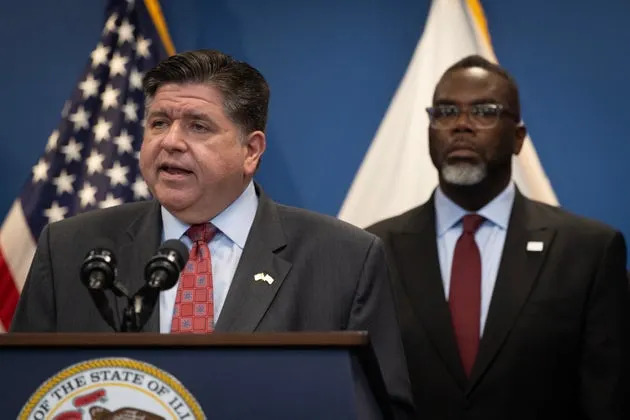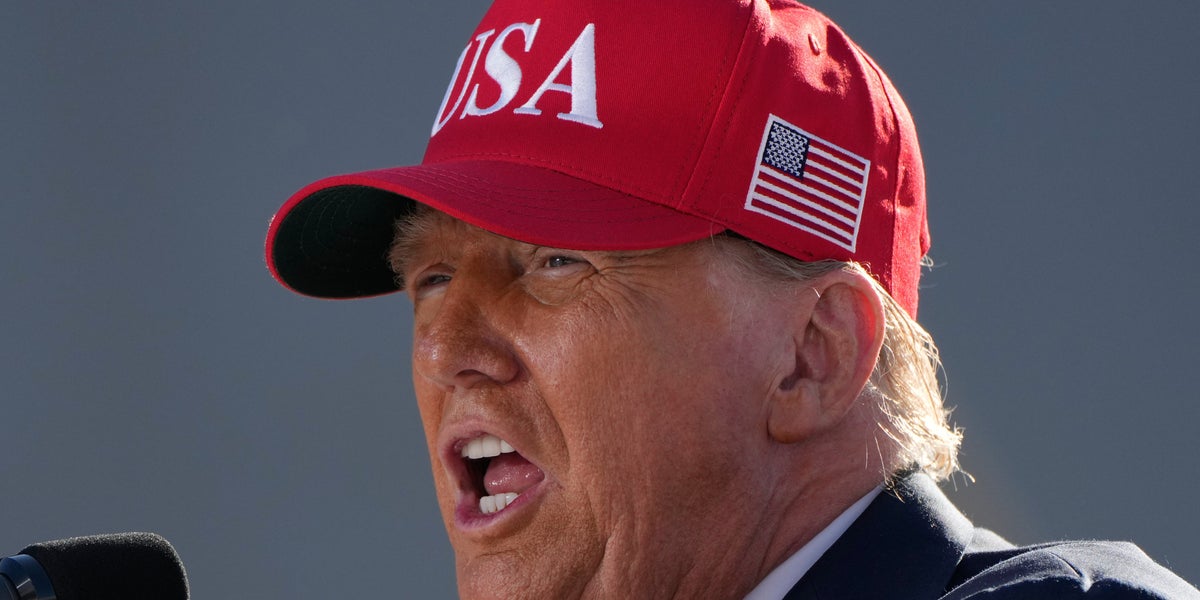National Guard troops from Texas have arrived in Illinois this week amid President Donald Trump’s efforts to send the military to Democrat-led cities — and despite strong objections from the leaders in the state.
One law professor from Northwestern University emphasized that the situation is “extremely” scary.
News: Chicago Mayor Blasts Trump Military Threats As ‘Flagrant Violation’ Of Constitution
Gov. Greg Abbott (R-Texas) said in a statement Sunday on X that he had fully authorized Trump to “call up 400 members of the Texas National Guard to ensure safety for federal officials.”
“You can either fully enforce protection for federal employees or get out of the way and let Texas Guard do it,” he wrote.
Since last month, the presence of U.S. Immigration and Customs Enforcement agents has ramped up in Chicago, resulting in violent immigration raids amid the Trump administration’s crackdown on immigrants.
On Sunday, Illinois Gov. JB Pritzker (D) told CNN that ICE agents had been “raiding neighborhoods where, instead of going after the bad guys, they’re just picking up people who are brown and Black and then checking their credentials.”
Life: MAGA Christians Want Wives To Stay At Home — But There’s An Ironic Hypocrisy
Communities and elected officials across the U.S. have been sounding the alarm on the president’s desire to send troops to U.S. cities with the purported mission of fighting crime. Trump, who has a long history of disparaging remarks about Chicago, has been threatening to send federal troops to the country’s third-largest city for months, even as violent crime rates overall in Chicago have fallen.
During a speech last week, Trump told senior military leaders in Virginia that he had suggested to Defense Secretary Pete Hegseth that certain U.S. cities be used as training grounds for the U.S. military.

Illinois Gov. JB Pritzker and Chicago Mayor Brandon Johnson photographed at a news conference on Oct. 6, 2025, in Chicago. Scott Olson via Getty Images
The Trump administration’s efforts to send troops to U.S. cities have faced legal challenges. The Posse Comitatus Act prohibits using the military for domestic law enforcement. A federal judge ruled last month that the Trump administration “willfully” violated the act by sending National Guard troops to Los Angeles in early June.
And over the weekend, a federal judge blocked the administration from deploying National Guard troops from any state to Oregon.
Life: The Funniest Posts From Women This Week (Sept. 27-Oct. 3)
On Monday, leaders in Illinois had filed a lawsuit to stop the deployment of troops to Chicago, but a judge declined to issue a temporary restraining order and scheduled a hearing for Thursday instead.
Paul A. Gowder, professor of law at Northwestern University’s Pritzker School of Law, emphasized that we are in “uncharted territory” as it relates to concerns about the deployment of the National Guard to a state over the objections of its governor.
“No president has ever tried to do anything like this,” he told HuffPost. “While presidents have invoked the Insurrection Act to bring in the military to address domestic unrest, this has typically been in response to actual rebellions and various other kinds of mob action (plus some really ugly abuses in the early days of the labor movement against strikers), and hasn’t been against the will of state governments.”
The Insurrection Act gives the president the authority to deploy the U.S. military domestically, but only under certain conditions, such as suppressing a rebellion, according to the Brennan Center for Justice. Trump told reporters on Monday that he’d be willing to invoke the Insurrection Act if necessary.
Life: Trump Floated A Seriously Disturbing Plan For U.S. Cities. Experts Say It’s ‘Very Concerning.’
Experts weigh in on the Texas National Guard’s presence in Illinois.
Gowder explained that the Constitution authorizes Congress to make rules for when the National Guard is deployed. So, “any use outside of what Congress has authorized is, for that reason, unconstitutional,” he said.
And the president, Gowder said, can call the National Guard under certain conditions in 10 U.S. Code § 12406 (Title 10). “Specific conditions have to be met: either there has to be a rebellion or invasion, or it has to be impossible to execute the laws of the United States (federal law) with ordinary personnel,” he said, before pointing to the following text in the statute: “Orders for these purposes shall be issued through the governors of the States.”
He said that the second pathway for deployment is under “Title 32 status.” The Brennan Center for Justice explains that “Title 32 status” works as a hybrid status that features both state and federal involvement, in which “the Guard remains under state command and control but can perform federal missions,” the website states.
Gowder emphasized that there’s been “no invasion or rebellion” and that protests against ICE raids in Chicago are not what’s considered a rebellion. What’s more, he said, ICE and Customs and Border Protection have seemed perfectly capable of executing — and “currently brutally over-executing” — the administration’s immigration laws.
Life: Teaching Left Her Deeply Unhappy — A Job At Costco Brought Her Back To Life
And as it relates to Title 32, Gowder said that the statute “presupposes a large degree of federal-state cooperation,” but it’s “really a mystery how it is supposed to apply when the state isn’t willing to have troops present.”
“Because Texas isn’t authorized to operate its national guard in Illinois, we essentially have a situation where one state is invading another,” he said. “Given that military conflict between states was the main thing the Constitution was supposed to prevent, I feel pretty safe calling such an interstate invasion unconstitutional.”
Atiba Ellis, professor of law, Laura B. Chisholm Distinguished Research Scholar, and associate dean for enrichment and engagement at Case Western Reserve University School of Law, believes that the administration’s deployment of National Guard troops to U.S. cities, “where the administration has pronounced an emergency (on not much basis aside from its own declaration)” is dubious.
“It conflicts with the long tradition of avoiding military entanglement with civilian law enforcement,” he later continued. “It is ironic that the Trump administration’s agenda appears to conflict with the traditional conservative commitment to allowing states full authority within their sovereign boundaries.”
Trump federalized members of the California National Guard in the summer, relying on Title 10. In a White House statement in June, the president claimed that there had been “numerous incidents of violence and disorder” that threatened to continue in response to ICE and other government personnel “performing Federal functions and supporting the faithful execution of Federal immigration laws.”
White House spokesperson Abigail Jackson confirmed to The Associated Press over the weekend that Trump had authorized use of the National Guard, citing what she referred to as “ongoing violent riots and lawlessness.”
Trump’s rhetoric is “extremely” scary and authoritarian, Gowder said.
Gowder said the arrival of the Texas National Guard in Illinois is “extremely” scary and authoritarian.
“The lawsuit that Illinois filed does a fantastic job of making the issues clear: This isn’t about the safety of federal personnel or some kind of rebellion, this is about punishing and disrupting Trump’s political opponents, and intimidating ordinary people with the spectacle of troops on the street,” he said.
Ellis said that the administration’s rhetoric surrounding the National Guard troops “sounds more like more of a political agenda rather than one of an emergency.”
“And that sets a dangerous precedent,” he said.
Gowder later emphasized that Trump “doesn’t like to have political opponents.”
“Because he and the people around him like [Stephen] Miller and [JD] Vance believe that he is entitled to rule by decree like a dictator,” he said. “But dictatorship only functions through intimidation, through heavily armed bully boys roaming the streets ready to hurt anyone who questions the regime.”
“ICE is already serving that function, but Mr. Trump evidently doesn’t think that’s enough and wants full-fledged military occupation to make the message perfectly clear,” he added.
Related…

